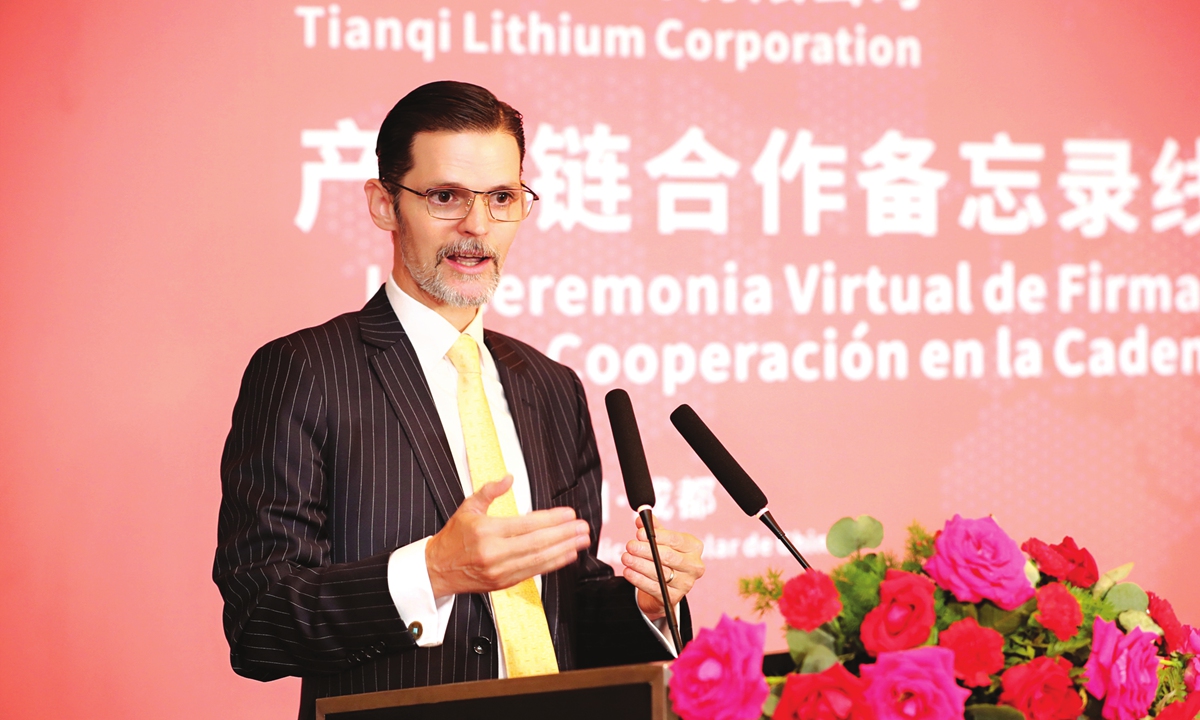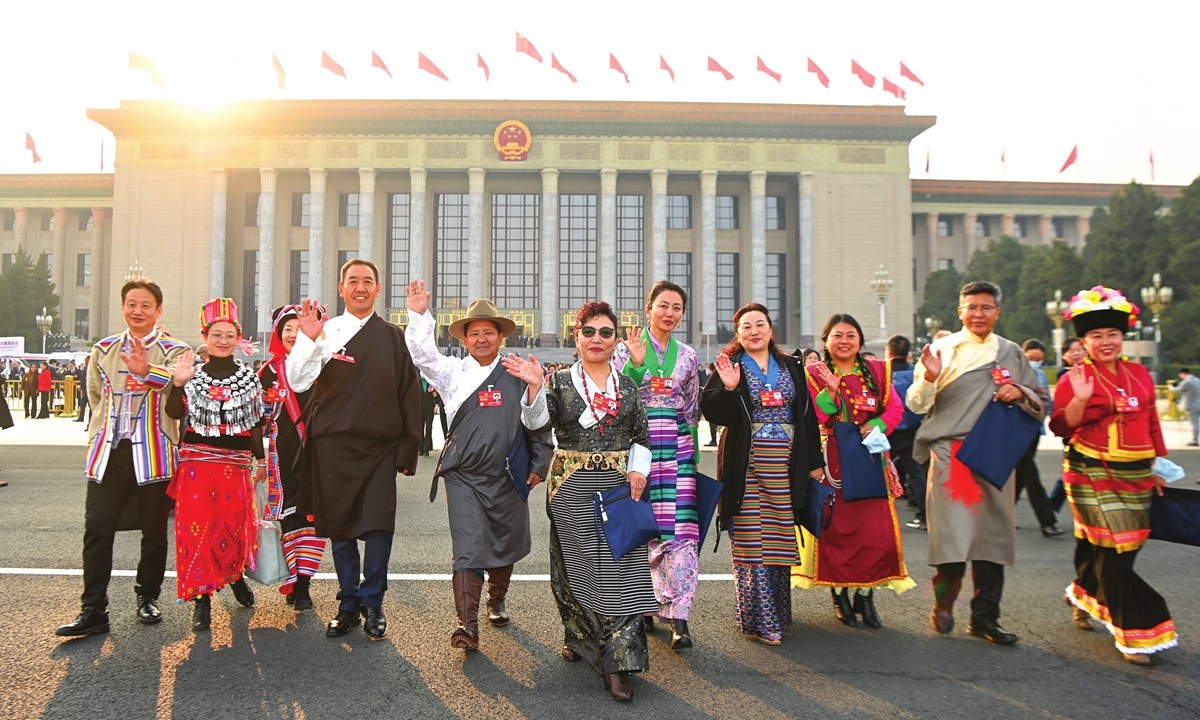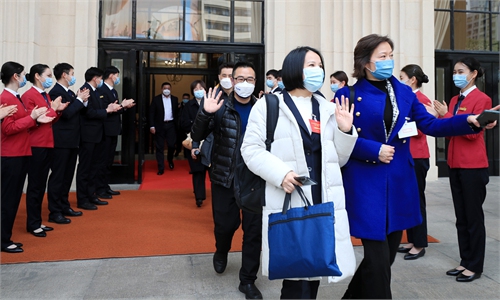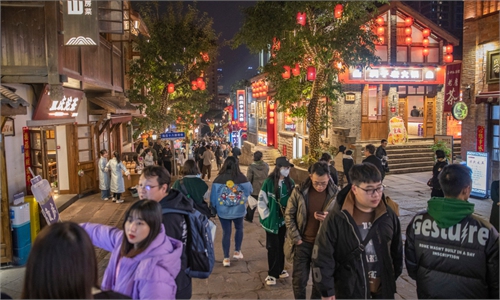IN-DEPTH / DIPLOMATIC CHANNEL
Argentina can learn from China’s modernization: ambassador
Editor's Note:
The ongoing two sessions - a significant event on China's political calendar - not only carries great significance for China, but also to the world. Diplomats from other countries stationed in Beijing are also closely watching the meetings with many of them trying to take references from China's development path to address the challenges their own countries face. What impressed the diplomats most at this year's two sessions? What cooperation with China do they envision? How do they understand China's modernization path? Global Times reporter Xie Wenting talks with Argentine Ambassador to China Sabino Vaca Narvaja and Nepali Ambassador to China Bishnu Pukar Shrestha on those topics.
It has become customary for Argentine Ambassador to China Sabino Vaca Narvaja to observe the annual sessions of China's national legislature and top political advisory body, known as the two sessions, a key event in China's political calendar.

"Every year it is important to listen and read what is being discussed at the two sessions, as during the meetings, ideas to address the challenges facing not only China but also other countries are discussed. We as politicians have to improve the quality of life of our people," Narvaja told the Global Times in an exclusive interview.
"But this year in particular, I think you have to read and reread what is happening here. This idea of creating a new pattern of development to promote quality growth and growth that looks more at the real economy and the well-being of people is central for me," he said.
Narvaja became the Argentine Ambassador to China in April 2021. He also has a Chinese name - Niu Wangdao. He chose this name for himself, partly because he took reference from the name of Chen Wangdao, the first person to translate The Communist Manifesto into Chinese.
Narvaja, born in Argentina, spent his childhood in Cuba and then returned to Argentina. The diplomat has a profound understanding of Communism and shows a strong interest in socialism with Chinese characteristics.
After reading the Government Work Report that Chinese Premier Li Keqiang delivered at the opening meeting of the first session of the 14th National People's Congress on Sunday morning, Narvaja said he paid special attention to the parts related to science and technology.
According to him, the debate on technological sovereignty, artificial intelligence, and global value chains after the [COVID-19] pandemic are important issues to which the world is paying the most attention. And it's important to be wary of behaviors that would stop the progress of world knowledge just to block the development of a country.
If the world went down that path, the quality of life of many people would be seriously influenced, including those in countries that want to impose the sanctions, he noted.
"We have already seen that walls are useless; we have to build cooperation bridges that will contribute to a new, more ecological, quality, and sustainable economy for the well-being of our societies," he said.
He pointed out that these debates that are taking place in China are taking place all over the world.

In Argentina, in particular, after the industrialization of lithium, they are advancing the development of an electromobility industry that allows for greater quality industrial development, since Argentina is one of the main holders of this strategic mineral.
China and Argentina are good friends and good partners. Argentina officially joined the China-proposed Belt and Road Initiative (BRI) in 2022. Argentina is also actively seeking BRICS membership, according to the ambassador.
On January 30, Chinese Foreign Minister Qin Gang had a phone call with Argentine Foreign Minister Santiago Cafiero.
"China will, as always, support Argentina in safeguarding national sovereignty and territorial integrity, and the two sides need to further advance high-quality Belt and Road cooperation," Qin said, according to Xinhua.
Narvaja told the Global Times that Argentina is now working with China to deepen cooperation. "One area is the industrialization of lithium that I have mentioned. There are also many other strong fields of cooperation, such as space technologies, clean energy, and the agricultural sector."
He also closely follows the ongoing two sessions to see China's latest policies in order to explore other cooperation opportunities. "It is necessary to observe the two sessions to look for new opportunities," he said.
"Each country has to make its own way, but without any doubt, the concept of a 'Chinese path to modernization' helps many of us to clarify priorities and objectives," the Argentine diplomat said.
"Modernization has to reach all social sectors, provide common prosperity, and allow personal and collective development, and this needs to be achieved in harmony with humanity and the planet we live on and in a sustainable and peaceful manner," he said. He specially highlights the Global Development Initiative and Global Security Initiative, projects presented by China within the framework of the United Nations.
While close China-Argentina ties are built on the basis of win-win and mutual respect, some Western media outlets and politicians have tried to smear this bilateral relations with ridiculous accusations.
Recently, a US lawmaker smeared China-Argentina relations, and accused Argentina of giving China a military foothold, according to Western media reports.
Narvaja refuted these accusations. "As a sovereign country, Argentina has to work together with all countries to achieve greater development that improves the quality of life of its population," he said.
China advocates for a diplomatic philosophy of win-win cooperation. The concept of "a global community of shared future" is now echoed in most parts of the world.
Narvaja pointed out that Argentina shares similar values with this concept.
"Our country advocates for multilateralism, a fairer financial system, and global governance that meet the real needs of our people. There should be bridges, instead of walls. Cooperation and solidarity should be upheld," he said.
The ongoing two sessions - a significant event on China's political calendar - not only carries great significance for China, but also to the world. Diplomats from other countries stationed in Beijing are also closely watching the meetings with many of them trying to take references from China's development path to address the challenges their own countries face. What impressed the diplomats most at this year's two sessions? What cooperation with China do they envision? How do they understand China's modernization path? Global Times reporter Xie Wenting talks with Argentine Ambassador to China Sabino Vaca Narvaja and Nepali Ambassador to China Bishnu Pukar Shrestha on those topics.
It has become customary for Argentine Ambassador to China Sabino Vaca Narvaja to observe the annual sessions of China's national legislature and top political advisory body, known as the two sessions, a key event in China's political calendar.

Argentine Ambassador to China Sabino Vaca Narvaja Photo: Courtesy of Argentine Embassy in Beijing
"Every year it is important to listen and read what is being discussed at the two sessions, as during the meetings, ideas to address the challenges facing not only China but also other countries are discussed. We as politicians have to improve the quality of life of our people," Narvaja told the Global Times in an exclusive interview.
"But this year in particular, I think you have to read and reread what is happening here. This idea of creating a new pattern of development to promote quality growth and growth that looks more at the real economy and the well-being of people is central for me," he said.
Narvaja became the Argentine Ambassador to China in April 2021. He also has a Chinese name - Niu Wangdao. He chose this name for himself, partly because he took reference from the name of Chen Wangdao, the first person to translate The Communist Manifesto into Chinese.
Narvaja, born in Argentina, spent his childhood in Cuba and then returned to Argentina. The diplomat has a profound understanding of Communism and shows a strong interest in socialism with Chinese characteristics.
After reading the Government Work Report that Chinese Premier Li Keqiang delivered at the opening meeting of the first session of the 14th National People's Congress on Sunday morning, Narvaja said he paid special attention to the parts related to science and technology.
According to him, the debate on technological sovereignty, artificial intelligence, and global value chains after the [COVID-19] pandemic are important issues to which the world is paying the most attention. And it's important to be wary of behaviors that would stop the progress of world knowledge just to block the development of a country.
If the world went down that path, the quality of life of many people would be seriously influenced, including those in countries that want to impose the sanctions, he noted.
"We have already seen that walls are useless; we have to build cooperation bridges that will contribute to a new, more ecological, quality, and sustainable economy for the well-being of our societies," he said.
He pointed out that these debates that are taking place in China are taking place all over the world.

Members of the Chinese People's Political Consultative Conference (CPPCC) National Committee walk out of the Great Hall of the People after the opening meeting of the first session of the 14th National Committee of the CPPCC held in Beijing on March 4, 2023. Photo: VCG
In Argentina, in particular, after the industrialization of lithium, they are advancing the development of an electromobility industry that allows for greater quality industrial development, since Argentina is one of the main holders of this strategic mineral.
China and Argentina are good friends and good partners. Argentina officially joined the China-proposed Belt and Road Initiative (BRI) in 2022. Argentina is also actively seeking BRICS membership, according to the ambassador.
On January 30, Chinese Foreign Minister Qin Gang had a phone call with Argentine Foreign Minister Santiago Cafiero.
"China will, as always, support Argentina in safeguarding national sovereignty and territorial integrity, and the two sides need to further advance high-quality Belt and Road cooperation," Qin said, according to Xinhua.
Narvaja told the Global Times that Argentina is now working with China to deepen cooperation. "One area is the industrialization of lithium that I have mentioned. There are also many other strong fields of cooperation, such as space technologies, clean energy, and the agricultural sector."
He also closely follows the ongoing two sessions to see China's latest policies in order to explore other cooperation opportunities. "It is necessary to observe the two sessions to look for new opportunities," he said.
"Each country has to make its own way, but without any doubt, the concept of a 'Chinese path to modernization' helps many of us to clarify priorities and objectives," the Argentine diplomat said.
"Modernization has to reach all social sectors, provide common prosperity, and allow personal and collective development, and this needs to be achieved in harmony with humanity and the planet we live on and in a sustainable and peaceful manner," he said. He specially highlights the Global Development Initiative and Global Security Initiative, projects presented by China within the framework of the United Nations.
While close China-Argentina ties are built on the basis of win-win and mutual respect, some Western media outlets and politicians have tried to smear this bilateral relations with ridiculous accusations.
Recently, a US lawmaker smeared China-Argentina relations, and accused Argentina of giving China a military foothold, according to Western media reports.
Narvaja refuted these accusations. "As a sovereign country, Argentina has to work together with all countries to achieve greater development that improves the quality of life of its population," he said.
China advocates for a diplomatic philosophy of win-win cooperation. The concept of "a global community of shared future" is now echoed in most parts of the world.
Narvaja pointed out that Argentina shares similar values with this concept.
"Our country advocates for multilateralism, a fairer financial system, and global governance that meet the real needs of our people. There should be bridges, instead of walls. Cooperation and solidarity should be upheld," he said.


